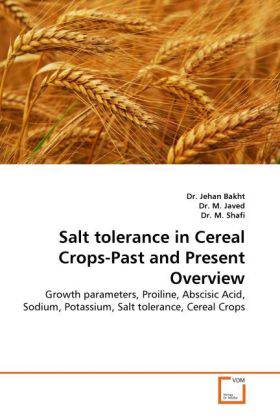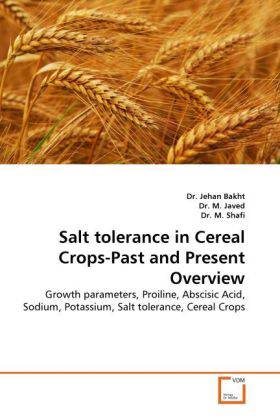
- Afhalen na 1 uur in een winkel met voorraad
- Gratis thuislevering in België vanaf € 30
- Ruim aanbod met 7 miljoen producten
- Afhalen na 1 uur in een winkel met voorraad
- Gratis thuislevering in België vanaf € 30
- Ruim aanbod met 7 miljoen producten
Zoeken
Salt tolerance in Cereal Crops-Past and Present Overview
Growth parameters, Proiline, Abscisic Acid, Sodium, Potassium, Salt tolerance, Cereal Crops
Jehan Bakht, M Javed, M Shafi
Paperback | Engels
€ 77,95
+ 155 punten
Omschrijving
The economy of Pakistanis predominantely agrarian and the prosperity ofpeople depends upon the proper management of cultivated land. The agriculture sector contributes 24% to the Gross Domestic Product of Pakistani economy and involves 75% of the labour force. Largeareas of arable land suffer from salinity and waterlogging, leading to a multitude of problems. Approximately 16 million of Pakistan's 160 million people live in regions with salty water or saline soils. Salinity has a severe impact on farmers and their resource base, affecting approximately 6.30 million hectares of land. Each year a further 25,000 ha of productive land is lost due to salinity. This book provides fundamental knowledge of salinity tolerance in wheat genotypes. This book will provide first hand information for academician, researchers and students and should be a part of every scientific library around the country.
Specificaties
Betrokkenen
- Auteur(s):
- Uitgeverij:
Inhoud
- Aantal bladzijden:
- 212
- Taal:
- Engels
Eigenschappen
- Productcode (EAN):
- 9783639340969
- Verschijningsdatum:
- 29/04/2011
- Uitvoering:
- Paperback
- Formaat:
- Trade paperback (VS)
- Afmetingen:
- 152 mm x 229 mm
- Gewicht:
- 317 g

Alleen bij Standaard Boekhandel
+ 155 punten op je klantenkaart van Standaard Boekhandel
Beoordelingen
We publiceren alleen reviews die voldoen aan de voorwaarden voor reviews. Bekijk onze voorwaarden voor reviews.











